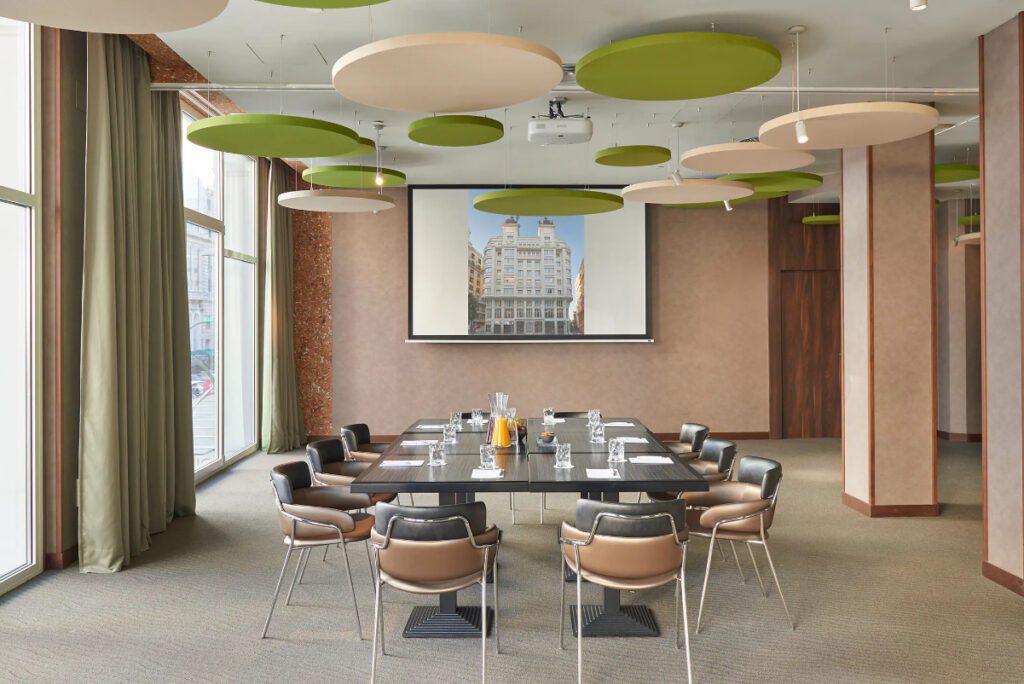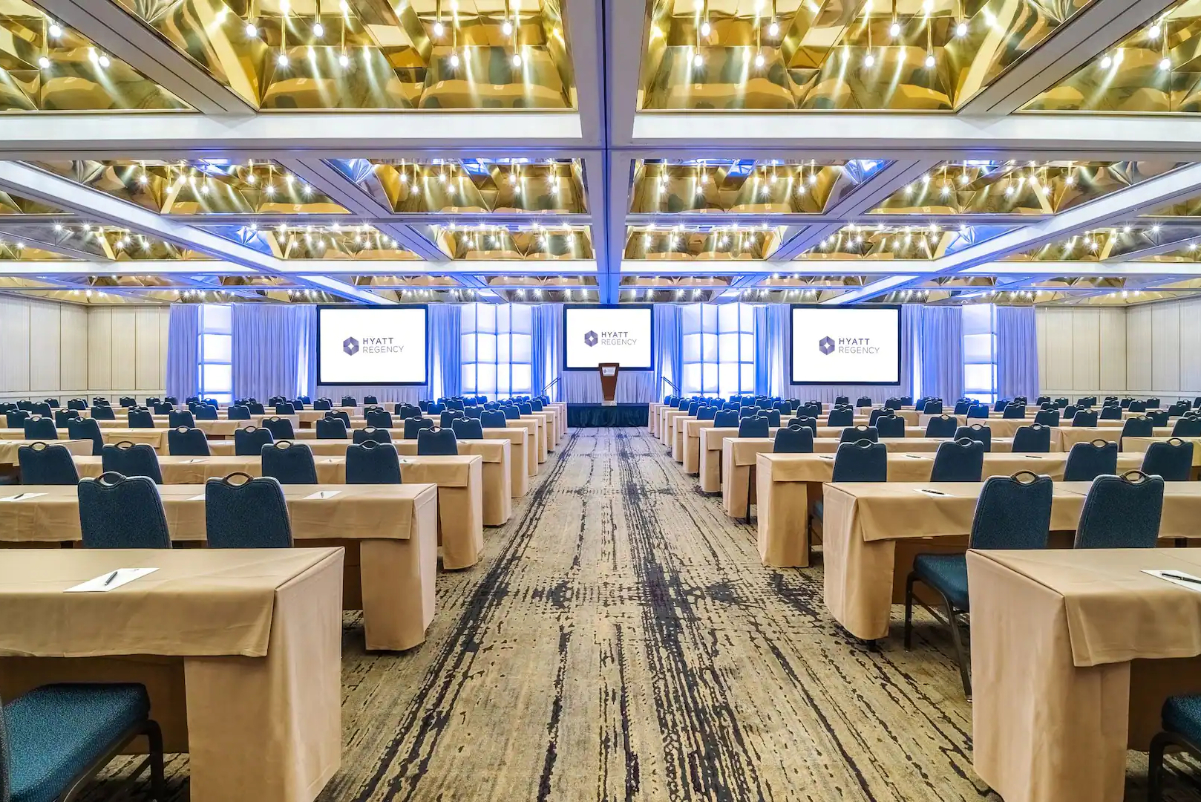Skift Take
Hyatt is a leading indicator of corporate travel, given how its 1,250 hotels and resorts are popular places to hold meetings and events. In good news, the company sees a revival.
The health of business travel remains a huge open question, but Hyatt, for one, pointed to positive signs when it reported second-quarter results Thursday.
“I’m extremely excited about the future as group room night demand continues to recover back to 2019 levels,” said Mark Hoplamazian, president and CEO.
The Chicago-based company’s 1,250 hotels and resorts are popular places to hold events, and corporate travel managers and meeting planners have reason to take heart by Hyatt’s upbeat report on bookings.
Optimistic Tone on Corporate Travel
In the second quarter, Hyatt reported growing strength in group bookings.
- Group revenue was up 14% year-over-year — and fully recovered compared to the second quarter of 2019.
- Group room night demand was down 12% from the pre-pandemic level. But strong pricing that roughly keeping pace with inflation — enabled revenues to rebound.
- Hyatt booked nearly $500 million in future group business, up roughly a third year-over-year. This set of commitments to group bookings was the second-highest in a quarter since the first quarter of 2019.
- About 42% of these group bookings were corporate, and associations made 32%.
- Executives said the pace of group bookings for the second half of this year is up 8% year-over-year. The 2024 group pace is up 10% year-over-year.
“We’re seeing sustained corporate demand on the group side,” Hoplamazian said. “So really, really encouraged to see that, and I think that that’s going to persist in the foreseeable future.”
Analysts see Hyatt’s results as reflective of a broader sector pattern.
In Morgan Stanley’s Global Corporate Travel Survey, 92 global travel managers said they expected a 9% year-over-year increase in corporate travel in the second half of this year and an 8% rise in 2024.
Analysts at Melius Research interpreted that and other surveys as “suggesting a much more optimistic tone on large corporate that has been stagnant for some time.”

Corporate Meetings at All-Inclusives?
While Hyatt is known for having many urban hotels with large ballrooms, the company sees an opportunity to encourage event planners to use its resorts to hold business gatherings, too.
“The one thing that I think hasn’t been realized in its fullest potential yet is the MICE [meetings, incentives, conferences, and events] business, or group business, that we can pull into more of these [all-inclusive resort] properties,” Hoplamazian said.
“There are considerations, I would say, with occasional concerns around safety and security, but the more exposure that we get for meeting planners and travel advisers, into our properties — in Riviera Maya and Cancun, especially — the more comfortable that we see people are getting, especially on the transient side,” Hoplamazian said. “And I think group [bookings] will follow.”
Record Quarter
Hyatt notched a few company records in the results it reported for the second quarter. It had records for group bookings, adjusted earnings, and its total management, franchise, and license fees.
Hyatt’s overall performance was robust.
- It generated a net income of $68 million on $921 million in revenue (after subtracting money owed to managed and franchised properties).
- Its adjusted earnings before interest, taxes, depreciation, and amortization were $273 million, up 7% year-over-year.
- The company’s revenue per available room — a key industry metric — rose 15% year-over-year on a comparable system-wide basis.
Hyatt continued to expand its empire.
- It achieved records for hotel and resort pipeline size and net rooms growth — reporting the highest pace of net rooms growth among its peers.
- Its “net rooms growth” was 6.9%.
- The company said it had a pipeline of 585 hotels with about 119,000 rooms — representing about 40% of the size of its current portfolio.
Hyatt Looks Ahead
The company gave an update on its long-term strategy to continue its shift to an asset-light model.
- It owns a significant minority of its branded hotels.
- But the company has been disposing of assets. It reconfirmed on Thursday its intent to sell another $1.2 billion worth of hotel assets by the end of 2024.
- Yet executives hinted that it was unlikely to see a major sale in the second half of this year.
Overall, corporate and business travel remains key to Hyatt sustaining its performance.
Ordinary business travel (transient individuals) has been recovering. In the second quarter, it hit about 86% of the level of the second quarter of 2019. Large corporate accounts in the Americas led the recovery, with May and June at 90% recovered versus 2019.
Hyatt’s rosy forecasts will be welcome news to the many corporate travel managers and meeting planners heading to the Global Business Travel Association conference, the largest in the sector, August 13-15.
Asset-Lighter Strategy: Hyatt is pursuing an “asset-lighter” strategy, intending to sell off real estate. The aim is to free up cash for future growth opportunities and return capital to shareholders. The company continues to keep sold real estate in the Hyatt family through long-term management or franchise agreements.
Growth Through Management and Franchise Contracts: Hyatt is focusing on increasing its select service properties by expanding management and franchise contracts. This approach aims to create a more stable, less volatile, higher margin portfolio.
Geographical Diversification: Hyatt is diversifying its portfolio geographically, with a particular focus on the Asia Pacific region and other areas experiencing stronger economic growth.
Investment in Adjacent Spaces: Hyatt is considering investments and initiatives that extend the Hyatt brand beyond the core hotel business into spaces relevant to their guests. This strategy aims to make Hyatt a bigger part of customers’ travel experiences.
It’s important to note that this strategy represents an evolution from the company’s traditional “asset-recycling” strategy, where it sold properties to reinvest that money into buying other hotels in markets where the real estate isn’t as expensive.
Have a confidential tip for Skift? Get in touch
Tags: corporate travel, earnings, future of lodging, hotel earnings, hyatt, Hyatt Hotels, meetings and events, mice
Photo credit: The Hyatt Regency Miami is a venue used for group events and conferences. Source: Hyatt.
